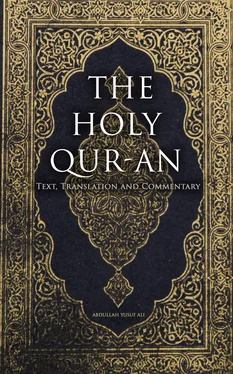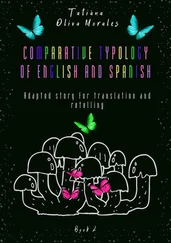Abdullah Ali - The Holy Qur-an - Text, Translation and Commentary
Здесь есть возможность читать онлайн «Abdullah Ali - The Holy Qur-an - Text, Translation and Commentary» — ознакомительный отрывок электронной книги совершенно бесплатно, а после прочтения отрывка купить полную версию. В некоторых случаях можно слушать аудио, скачать через торрент в формате fb2 и присутствует краткое содержание. Жанр: unrecognised, на английском языке. Описание произведения, (предисловие) а так же отзывы посетителей доступны на портале библиотеки ЛибКат.
- Название:The Holy Qur-an: Text, Translation and Commentary
- Автор:
- Жанр:
- Год:неизвестен
- ISBN:нет данных
- Рейтинг книги:5 / 5. Голосов: 1
-
Избранное:Добавить в избранное
- Отзывы:
-
Ваша оценка:
- 100
- 1
- 2
- 3
- 4
- 5
The Holy Qur-an: Text, Translation and Commentary: краткое содержание, описание и аннотация
Предлагаем к чтению аннотацию, описание, краткое содержание или предисловие (зависит от того, что написал сам автор книги «The Holy Qur-an: Text, Translation and Commentary»). Если вы не нашли необходимую информацию о книге — напишите в комментариях, мы постараемся отыскать её.
The Holy Qur-an: Text, Translation and Commentary — читать онлайн ознакомительный отрывок
Ниже представлен текст книги, разбитый по страницам. Система сохранения места последней прочитанной страницы, позволяет с удобством читать онлайн бесплатно книгу «The Holy Qur-an: Text, Translation and Commentary», без необходимости каждый раз заново искать на чём Вы остановились. Поставьте закладку, и сможете в любой момент перейти на страницу, на которой закончили чтение.
Интервал:
Закладка:
6 Show us the straight way,
7The way of those on whom Thou hast bestowed Thy Grace, those whose (portion) is not wrath, and who go not astray.
2. Baqara, or the Heifer
Table of Contents
Introduction and Summary
Introduction To Sūra 2 (Baqara)
As the Opening Sūra sums up in seven beautiful verses the essence of the Qur'ān, so this Sūra sums up in 286 verses the whole teaching of the Qur'ān. It is a closely reasoned argument.
Summary. —It begins (verses 1-29) with mystic doctrine as to the three kinds of men and how they receive God's message.
This leads to the story of the creation of man, the high destiny intended for him, his fall, and the hope held out to him (2:30-39).
Israel's story is then told according to their own records and traditions—what privileges they received and how they abused them (2:40-86), thus illustrating again as by a parable the general story of man.
In particular, reference is made to Moses and Jesus and their struggles with an unruly people: how the people of the Book played false with their own lights and in their pride rejected Muhammad, who came in the true line of apostolic succession (2:87-121).
They falsely laid claim to the virtues of Father Abraham: he was indeed a righteous Imām, but he was the progenitor of Ismā'īl's line (Arabs) as well as of Israel's line, and he with Ismā'īl built the Ka`ba (Temple of Mecca) and purified it, thus establishing a common religion, of which Islam is the universal exponent (2:122-141)
The Ka`ba was now to be the centre of universal worship and the symbol of Islamic unity (2:142-167).
The Islamic Ummat (brotherhood) having thus been established with its definite centre and symbol, ordinances are laid down for the social life of the community, with the proviso (2:177) that righteousness does not consist in formalities, but in faith, kindness, prayer, charity, probity, and patience under suffering. The ordinances relate to food and drink, bequests, fasts, jihād , wine and gambling, treatment of orphans and women, etc. (2:168-242).
Lest the subject of jihād should be misunderstood, it is taken up again in the story of Saul, Goliath and David, in contrast to the story of Jesus (2:243-253).
And so the lesson is enforced that true virtue lies in practical deeds of manliness, kindness, and good faith (2:254-283), and God's nature is called to mind in the sublime Ayat-ul-Kursī , the Verse of the Throne (2:255).
The Sūra ends with an exhortation to Faith, Obedience, a sense of Personal Responsibility, and Prayer (2:284-286).
This is the longest Sūra of the Qur'ān, and in it occurs the longest verse (2:282). The name of the Sūra is from the Parable of the Heifer in 2:67-71, which illustrates the inefficiency of carping obedience. When faith is lost, people put off obedience with various excuses: even when at last they obey in the letter, they fail in the spirit, which means that they get fossilized, and their self-sufficiency prevents them from seeing that spiritually they are not alive but dead. For life is movement, acitivity, striving, fighting against baser things. And this is the burden of the Sūra.
This is in the main an early Medina Sūra.
The Message and the Men, 2:1-29
C. 44.(2:1-29)—The Message of God is a guide that is sure
To those who seek His light. But those
Who reject faith are blind: their hearts
Are sealed. Woe to the hypocrites,
Self-deceived and deceiving other,
With mockery on their lips, and mischief
In their hearts, and fear: the clouds
That bring fertilizing rain to others,
To them bring but deafening thunder-peals
And lightning flashes blinding to their eyes.
Sūra 2.
Baqara , or the Heifer
In the name of God, Most Gracious, Most Merciful.
1 A. L. M.
2This is the Book; in it is guidance sure, without doubt, to those who fear God;
3Who believe in the Unseen, are steadfast in prayer, and spend out of what We have provided for them;
4And who believe in the Revelation sent to thee, and sent before thy time, and (in their hearts) have the assurance of the Hereafter.
5They are on (true) guidance, from their Lord, and it is these who will prosper.
6 As to those who reject Faith, it is the same to them whether thou warn them or do not warn them; they will not believe.
7God hath set a seal on their hearts and on their hearing, and on their eyes is a veil; great is the penalty they (incur).
Section 2.
8 Of the people there are some who say: "We believe in God and the Last Day;" but they do not (really) believe.
9Fain would they deceive God and those who believe, but they only deceive themselves, and realise (it) not!
10In their hearts is a disease; and God has increased their disease: And grievous is the penalty they (incur), because they are false (to themselves).
11When it is said to them: "Make not mischief on the earth," they say: "Why, we only Want to make peace!"
12Of a surety, they are the ones who make mischief, but they realize (it) not.
13When it is said to them: "Believe as the others believe:" They say: "Shall we believe as the fools believe?"—Nay, of a surety they are the fools, but they do not know.
14When they meet those who believe, they say: "We believe;" but when they are alone with their evil ones, they say: "We are really with you: We (were) only jesting."
15God will throw back their mockery on them, and give them rope in their trespasses; so they will wander like blind ones (To and fro).
16These are they who have bartered Guidance for error: But their traffic is profitless, and they have lost true direction,
17 Their similitude is that of a man who kindled a fire; when it lighted all around him, God took away their light and left them in utter darkness. So they could not see.
18Deaf, dumb, and blind, they will not return (to the path).
19Or (another similitude) is that of a rain-laden cloud from the sky: In it are zones of darkness, and thunder and lightning: They press their fingers in their ears to keep out the stunning thunder-clap, the while they are in terror of death. But God is ever round the rejecters of Faith!
20The lightning all but snatches away their sight; every time the light (helps) them, they walk therein, and when the darkness grows on them, they stand still. And if God willed, He could take away their faculty of hearing and seeing; for God hath power over all things.
Section 3.
21 Oye people! Adore your Guardian-Lord, who created you and those who came before you, that ye may have the chance to learn righteousness;
22Who has made the earth your couch, and the heavens your canopy; and sent down rain from the heavens; and brought forth therewith Fruits for your sustenance; then set not up rivals unto God when ye know (the truth).
23And if ye are in doubt as to what We have revealed from time to time to Our servant, then produce a Sūra like thereunto; and call your witnesses or helpers (If there are any) besides God, if your (doubts) are true.
24But if ye cannot—and of a surety ye cannot—then fear the Fire whose fuel is men and stones,—which is prepared for those who reject Faith.
25But give glad tidings to those who believe and work righteousness, that their portion is Gardens, beneath which rivers flow. Every time they are fed with fruits therefrom, they say: "Why, this is what we were fed with before," for they are given things in similitude; and they have therein companions pure (and holy); and they abide therein (for ever).
Читать дальшеИнтервал:
Закладка:
Похожие книги на «The Holy Qur-an: Text, Translation and Commentary»
Представляем Вашему вниманию похожие книги на «The Holy Qur-an: Text, Translation and Commentary» списком для выбора. Мы отобрали схожую по названию и смыслу литературу в надежде предоставить читателям больше вариантов отыскать новые, интересные, ещё непрочитанные произведения.
Обсуждение, отзывы о книге «The Holy Qur-an: Text, Translation and Commentary» и просто собственные мнения читателей. Оставьте ваши комментарии, напишите, что Вы думаете о произведении, его смысле или главных героях. Укажите что конкретно понравилось, а что нет, и почему Вы так считаете.












